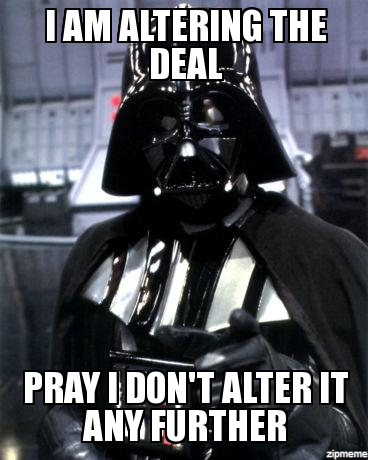“Ignorance of the law is no excuse” and “I’m a law abiding citizen” rank towards the top on my list of hated phrases. Law enforcers and prosecutors like to claim that ignorance of the law is no excuse when they’re arresting and taking you to court respectively. Judges are even in on the game. They tell jurors, while wearing a straight face no less, that their verdict must be based on the letter of the law. Then there’s the defendant. Up until he found himself in court he very well may have said that he was a law abiding citizen. He might even compound his ignorance by saying he looked forward to his day in court so he could prove his innocence. The lawyers, prosecutors, and judges are demanding that people be held to an impossible standard. The person who calls himself a law abiding citizen is a fool.
I’m sure there’s at least one person who considers themselves a law abiding citizen scoffing at my previous sentence. If that person is you, there’s an exercise that you can perform to prove me wrong. The only thing you need for this exercise is a pen and paper. Without looking any up write down every law for the municipality, county, and state in which you live. Then write down every federal law. When you’ve finished writing down all of the laws you know, look up all of the laws you missed.
You’ll find that you missed most of them. I know this for certain because if you did start writing down every law under which you live, you would die of old age before you finished. Maybe you think you could do so if you had enough time. If you believe that, begin reading through the laws under which you live and only write down the ones you didn’t know. Since legal professionals like lawmakers, judges, and lawyers don’t know the entirely of the law, I have my doubts that you do.
The bottom line is the everybody is ignorant of the law. Since everybody is ignorant of the law, it’s impossible for anybody to know that they’re a law abiding citizen.
This situation is even more dire when you stop to consider that the body of law is in a constant state of change. City council members, senators, congressmen, and other lawmakers are constantly tweaking existing laws and creating new ones. Even if you did manage to learn every law under which you live, your knowledge would quickly be outdated. Then you have to take into account the rulings made by various judges. Their rulings ultimately decide what the letter of the law actually means. And they frequently invalidate each others’ rulings so their rulings too are in a constant state of flux.
I’m left with a question that should seem obvious at this point. Why isn’t ignorance of the law an excuse? If legal professionals who attend specialized schooling can’t comprehend the entirety of the law, why are laymen expected to do so? Why is a system built on a practically uncountable number of laws that are frequently conflicting and always changing considered just?
I call bullshit on the entire concept. Ignorance of the laws should be an excuse.
